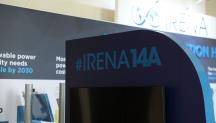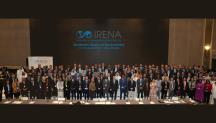

Africa Takes the Lead to Champion an Innovative Approach for Its Energy Transition
Newsletter
Deploying renewable energy is key for Africa to achieve climate goals and meet its massive economic and development needs. Despite being endowed with an abundance of renewable resources, Africa’s energy transition has not picked up its pace yet.
With less than 2% of global investments in renewable energy received over the past two decades, Africa has historically been left behind in the global energy transition. This underinvestment has left three-quarters of the world's population without adequate energy access. Therefore, accelerating the shift to a sustainable energy future requires significant and rapid growth of investments in the African energy system.
Today, a transformative change is underway, signalling a pivotal moment in the continent's developmental trajectory. Launched at the COP28 last year, the Accelerated Partnership for Renewables in Africa (APRA) built on the Nairobi Declaration on Climate Change announced during the Africa Climate Summit, Kenya in September 2023. APRA spearheads a unique collaborative platform which puts the African nations in the steering wheel.
The Nairobi Declaration on Climate Change and Call for Action underscore Africa's inherent capacity to lead a climate-compatible industrial revolution. The Declaration set an ambitious target to increase the continent's renewable capacity from 56 GW in 2022 to 300 GW by 2030. This aligns with the broader goals of COP28 to triple renewable energy capacity and double efficiency measures globally.
To discuss APRA’s implementation strategy and explore ways to maximise efforts towards the above capacity target, the International Renewable Energy (IRENA) as APRA’s secretariat organised a plenary session on the last day of its 14th Assembly in Abu Dhabi, United Arab Emirates. The session emphasised on the diverse circumstances of African countries and regions, advocating for a tailoured approach rather than a one-size-fits-all strategy.

Delivering a scene-setting speech at the session, Davis Chirchir, Cabinet Secretary for Energy and Petroleum, Ministry of Energy, Kenya, said, “We need an approach tailoured to the unique needs of our countries. The lack of proper infrastructure causes stagnation and delays progress. We advocate for a climate change finance model that equips Africa in combatting climate change alongside counterparts worldwide. Initiatives like APRA drives tangible change in infrastructure and promotes green industrialisation.”
APRA's objectives are clear; mobilise finance, engage the private sectors and provide targeted technical assistance and capacity building. APRA's innovative approach is guided by national plans crafted by member countries, thereby ensuring that initiatives are tailoured to specific needs and circumstances.
During the moderated discussions, panellists pointed out the importance of contextualised support, reiterating the fact that each African country is unique in its needs and priorities. However, Edgar Moyo, Zimbabwe’s Minister of Energy and Power Development, also emphasised, “APRA membership should not merely be seen as support for individual countries, but as a collective effort representing the entire continent of Africa.”
Furthermore, the dialogue highlighted the need for additional resources and mechanisms to amplify the impact of international cooperation in advancing renewable energy adoption in Africa. Building a robust local private sector was recognised as crucial for fostering resilience in the renewable sector, with APRA and other partnerships playing a vital role in this endeavour.
In this regard, Kornelia Shilunga, Namibia’s Deputy Minister of Mines and Energy said, “APRA should be used to unlock affordable finances to support local private sector. The partnership should serve as a vehicle for green growth and green industrialisation which will generate meaningful socio-economic impact.”
As Africa stands at this crossroads, the commitment and collaborative efforts must be directed at addressing challenges faced by APRA members*. The partnership offers a hopeful glimpse into a future, where renewable energy not only powers the continent but also propels it towards sustainable and inclusive economic growth.
*Presently, APRA members include Kenya, Ethiopia, Ghana, Namibia, Rwanda, Sierra Leone, and Zimbabwe, with support from global partners such as Denmark, Germany, the UAE, and the USA.
.jpg?rev=52674ec6b7d84bd2b148530cb0d45efd&w=216&h=123&as=1&bc=ffffff&cc=1&hash=0624A9F4CA36183CAF239659CDFF709E)



